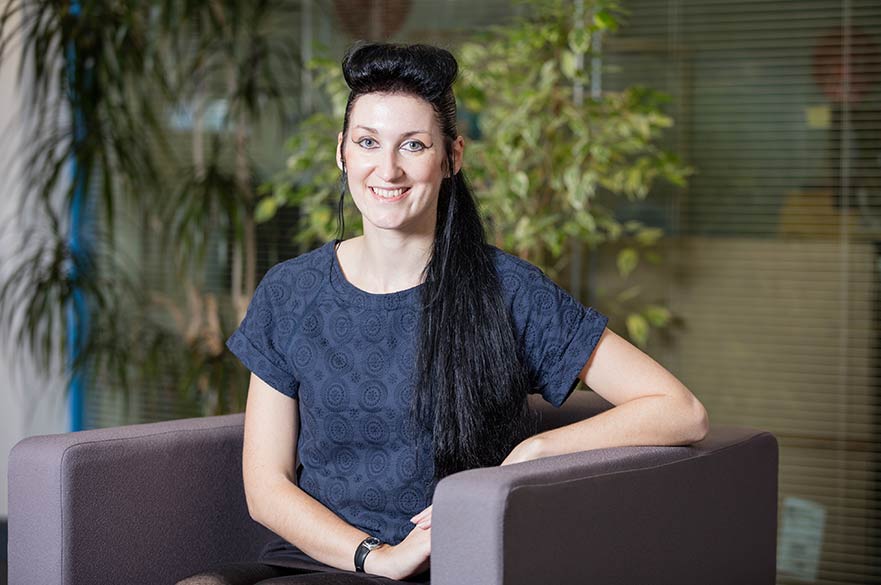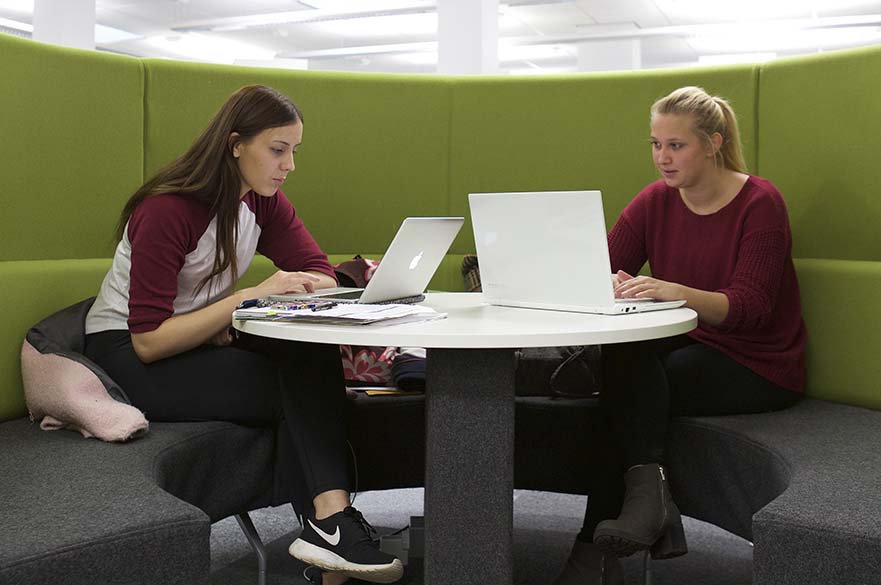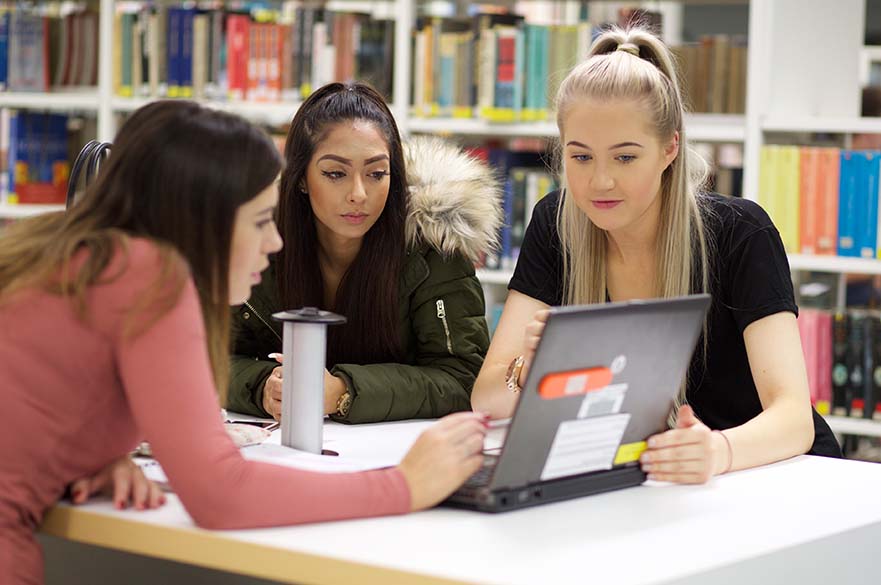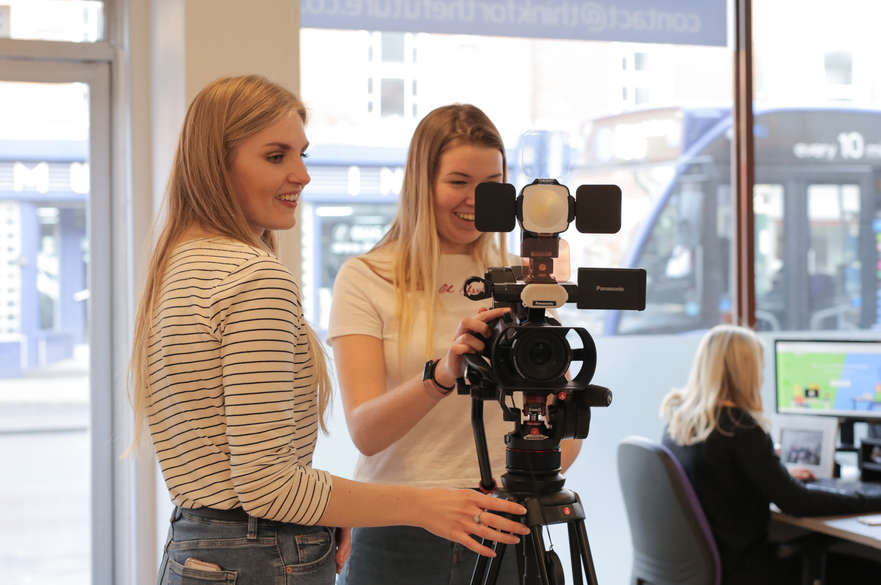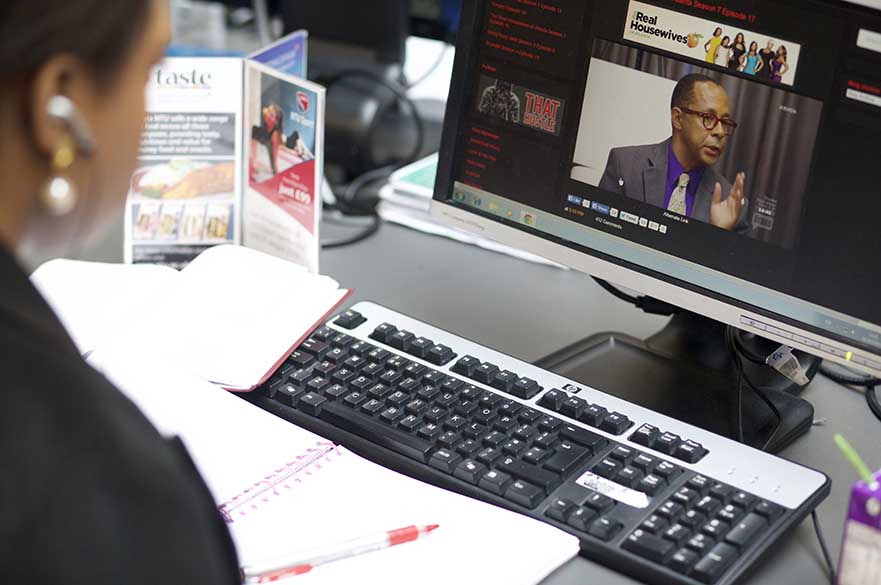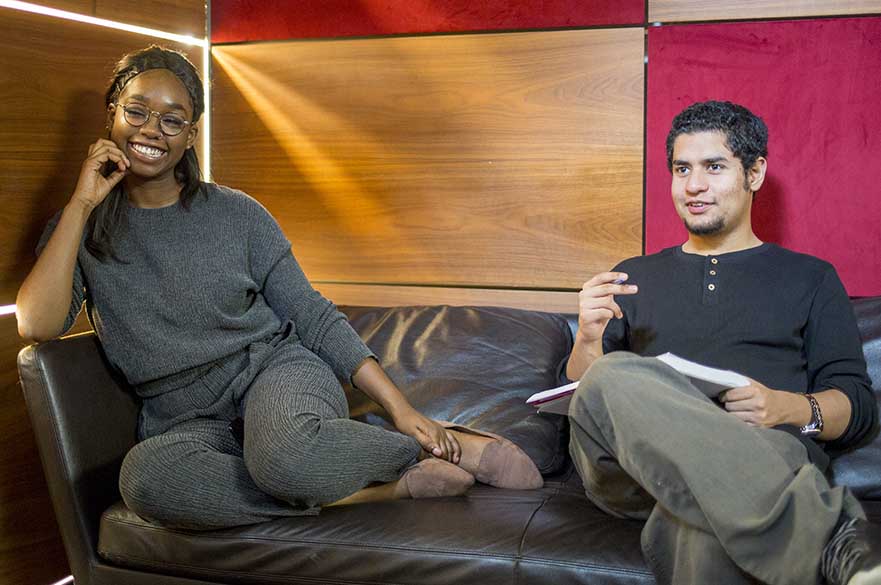Beat the Clearing queue
About this course
We invite you to examine how writers, filmmakers and showrunners build and explore worlds, whilst taking you on a journey across the globe to develop your passion for books, blockbusters and boxsets.
The BA (Hons) English and Film & TV degree unlocks the power of storytelling. Through an interdisciplinary approach that combines theory, analysis, and creative practice, you’ll gain a deep appreciation for the ways in which literature, film, and television shape our understanding of the world around us.
You’ll benefit from a collaborative learning environment that fosters creativity and innovation, working closely with fellow students, academics and industry professionals, whilst plotting a personalised pathway through this dynamic course thanks to its mix of modules on national, international, and transnational cinematic, televisual, and literary traditions. From Scorsese to Shakespeare, we’ve got it covered.
Alongside subject expertise, you’ll develop your ability to express yourself across a range of different platforms, including video essays, podcasts, and blogs, and gain first-hand experience of a host of graduate workplace skills, including teamwork, event management and flexibility. You’ll also learn how to communicate the significance of film, television, fiction, poetry, theatre and creative non-fiction in the context of current global challenges.
Through a mixture of close analysis, contextualisation, and theory and of the classical, the contemporary and the international, you’ll graduate with a wide range of dynamic skills that are highly valued by employers, including excellent communication, advanced analytical skills, entrepreneurial self-confidence and a positive attitude when problem solving.
Upon graduation, you’ll be well-prepared to navigate the evolving film, televisual and literary landscapes and be able to make meaningful contributions to these fields across a wide range of careers in the cultural and creative industries, including publishing, teaching and film exhibition and distribution.
7
What you’ll study
Each year you’ll study a number of core modules from the lists below and you’ll have the opportunity to select from a range of optional modules to give yourself a more specialised pathway, depending on your interests.
In the second half of Year Two you can take your learning into your own hands and choose an extended work placement, learn at one of our many partner institutions worldwide, or continue to study here with a wide range of interesting optional modules to choose from.
Work-like experience
Work-like experience is embedded throughout your degree, ensuring that you are given multiple opportunities across three years to develop your career goals and build the skills and experience needed to achieve them. These embedded work-like experience opportunities are much more than a placement, and ensure that you develop the skills and competencies that employers demand. You will take part in a minimum of 240 hours of work-like experience during your course, with the option to take an extended 10-week work placement in your second year.
What does work-like experience mean?
Work-like experience defines a wide range of activities which will build your skills and hone your confidence to prepare you for a professional career after graduation. You will be given opportunities to engage in client-led projects, volunteering, consultancy, professional development, vocational training, project management and team work. You will expand and enhance your creative and communications skills through practical projects, producing podcasts and videos, organising campaigns, curating social media content and visual media. This rich and diverse experience will ensure that you graduate with the skills and confidence to thrive in your own career path.
Transformation modules
Each year you will take a core collaborative module. These modules are linked and will build on each other to ease you into University life, support you with mentoring and personal tutoring, begin your professional development, and expand your horizons with collaborative projects and assessments both within your subjects and wider afield.
Core modules
Literary Pasts, Presents and Futures
This module places literatures from different eras (from Middle English to the present day) in dialogue, inviting students to consider how texts ‘speak’ to one another across the ages. It builds a critical understanding of literary heritage in which students reflect on fundamental issues in the study of English, such as the nature of literary ‘tradition’, the formation of the literary canon, intertextuality, textual innovation and reader positionality. The module reveals literary histories to be of enduring relevance to the contemporary moment and invites students to consider what the future might hold for studies in the subject.
Ways of Reading
This module introduces students to different ways in which it is possible to read and interpret texts and asks many questions: what is a ‘text’? How do they ‘talk’ to each other? Who decides what is great literature? We explore a range of reading from different eras and forms, and practise reading through a variety of ‘lenses’ including gender, race, trauma, and the environment. This will encourage you to read texts from a particular perspective, and question what assumptions we make as we read, the relationship between the text and the world, and what it means to be human.
Film and TV style in close-up
This module introduces you to the diversity of film and television style and invites you to think carefully about different forms of film and television from the 'mainstream' and the margins, home and abroad. You will learn all about the fundamentals of close textual analysis, as well as how to interpret film and television style across a diverse range of forms, periods and styles. The module also compares how the two mediums are similar and different and looks at the contexts that inform medium specificity.
The Bigger Picture: core concepts, contexts and debates in film and television studies
On this module you will develop your understanding of some of the key debates, concepts and contexts that inform film and television studies, typically including genre, stardom, authorship, documentary, representation and sustainability. The module also introduces you to some of the key drivers of change that are transforming the film and TV industries, both on- and off-screen, so that you gain confidence in advocating and agitating for greater diversity, inclusion and equality in the film and TV industries, as well as for more sustainable film and TV production and consumption.
Transformation: Agency and Self
This first-year module introduces you to interdisciplinary study with a focus on how the humanities help us to understand what is means to be human from different disciplinary perspectives, providing you with opportunities to explore and make connections between your subjects. The module introduces the role and value of the humanities to contemporary society. It also encourages you to better understand, and reflect on, your own place within your course and on your academic, personal, and professional development as you transition to higher education. In doing so, the module develops your key academic skills, introduces NTU support, and helps to create a sense of community and belonging for students studying courses in Joint Honours Humanities. For this module you will be assessed through a creative project based on a live brief, and a piece of reflective writing.
Optional modules typically include - choose one
Global Narratives in English
English Literature is a global phenomenon. Authors write and publish in English across many continents and contexts, offering a rich array of cultural insights and voices. The emergence of literature written in English across the world bears a difficult history, however, and invites us to reflect carefully on the political dynamics that have shaped its journey. This module discusses texts from a range of global locations to equip students not only with an appreciation of the diversity of English literature as a global phenomenon but with an astute awareness of its political underpinnings, as well as its constantly evolving potentials.
International Ciné-Club
On this module you will travel the world and the world of cinema. Each week you will visit a different international film movement and get to know its key films and filmmakers, as well as figures typically found on the margins of major film movements and world cinema. Thanks to weekly ciné-club sessions, which will include film screenings and plenty of discussion opportunities, the module will foster a lively film culture and community with you at the heart of it.
Core modules
Rebel Literatures
Inspired by Nottingham’s status as a UNESCO City of Literature renowned for its ‘rebel writers’, this second-year core module explores how a spirit of rebellion has animated literary creativity over the past 150 years. From the fights for educational rights advanced by the New Woman authors of the late C19th to the voices of early C21st activist poets, this module invites you to consider the bold arguments advanced by authors at the forefront of cultural change. It includes the exciting opportunity to explore unique materials from the rich archives of radical literature held across Nottingham.
Putting Film and TV into practice
This module explores the vibrant and varied theoretical landscape that shapes our understanding of the big and small screen. It draws upon canonical work in film theory and television studies, as well as theories that attend to more marginal screens, texts, audiences, and industries, enabling you to theorise classical Hollywood cinema and popular TV genres, as well as films and shows from alternative filmmaking and televisual perspectives and practices.
Transformation: Agency and World
This second-year module enables you to develop your understanding and practice of interdisciplinary study through a focus on the role and value of the humanities for understanding and engaging with sustainable futures and the future of work, beginning with addressing challenges we face in the present and actions we might take. Interrogating local, national, and global sustainability frameworks from a multi- and interdisciplinary perspective, the module provides an opportunity for you to bring together both of your subjects to address questions of sustainability and enterprise in a variety of sectors and contexts. The module enables you to reflect on your own place within these debates and their relation to your academic, personal, and professional development. As part of the module all students will complete an 80-hour work placement experience. You will be assessed through a professional portfolio and placement report.
Optional pathways
Pathway 1: Extended work-like experience
Get the experience you need for after you graduate, and really understand how the things you study translate into the world of work with a work placement. Your highly experienced Employability Team will help you find a placement to suit your career goals from our huge network of companies, charities, institutions, and beyond.
Pathway 2: An international exchange
Travel the world, meet new friends, and have experiences you will remember for the rest of your life.
Our flexible curriculum has been designed to allow some amazing opportunities for you. Your second year of study is divided into two semesters, giving you the opportunity to take part in an international exchange. You could study with one of international exchange partners in Australia, Europe, USA, Canada, Thailand and many, many more.
Our dedicated team will support you in finding and arranging a suitable exchange. And don't worry about the cost, they will help you apply for any grants or loans you may need, as no one should miss out on the chance to broaden their horizons.
Pathway 3: Taught modules
Interdisciplinary optional modules typically include:
Intercultural Communication at Work
Gain the knowledge, skills and strategies to build your intercultural communication competence. Analyse and reflect on the impact of culture(s) on your values, assumptions, perceptions, expectations, and behaviours. Build successful verbal and non-verbal communication strategies in different intercultural settings.
People and Planet: pasts, presents, and futures
In this module you will develop an understanding of the human impact on the environment from the 15th Century to the present as a form of slow but sustained violence enacted against the planet. It will also explore how such long-term change can interact with social justice in the present day.
Film & TV optional modules typically include:
British Cinema
This module looks at British cinema from 1960 onwards from a variety of perspectives. It considers how ‘British cinema’ is defined and its purpose in terms of representation and diversity in the face of the dominance of Hollywood. We study topics including the Bond franchise, Swinging London, social realism, the British gangster film, Hammer horror, the costume drama, Thatcherism on screen, New Scottish cinema and ‘the Troubles’ in Northern Ireland. We also visit Broadway cinema for a screening and industry talk.
Analysing British Television
This module explores in-depth the specific characteristics of the British TV landscape. It introduces students to the story of British television. It surveys important factors and influences that have historically shaped British television industries and institutions, as well as forms and genres. Second, it explores different televisual mediation of class, gender and race/ethnicity. Third, it explores the key genres which enable us to make sense of British television both in the past and in the present.
Film Programming
This module gives you the opportunity to devise, plan and run your own pop-up film event. Working in groups, and alongside experienced industry professionals, you will be responsible for identifying an event theme, selecting and curating event content, and delivering your film event at one of a series of city venues. Across the module you will gain industry-ready skills in research and curation, pitching and collaboration, licensing and copyright, venue management and setup, PR and promotion, and event production and management, alongside a unique insight into Notts film culture.
English optional modules typically include:
Shakespeare and Co.
Shakespeare was born in 1564 and so his life was coincident with the rise of the brand new, state of the art, professional theatre. On this module we'll explore these cutting-edge plays in a context of rapid social change and religious and political uncertainty. We’ll introduce you to playwrights of the period, their dramatic techniques, reception, critical and theatrical history and we'll also consider modern spin-offs of their plays – film versions and modern retellings. Topics covered will include colonialism, religious difference, sex and gender, nation and ethnicity, selfhood.
Black Writing in Britain
Bernardine Evaristo was the first Black British writer to win the Booker Prize, in 2019, more than seventy years after Sam Selvon and George Lamming moved to Britain in what is known as the Windrush migration, in 1948. This module reads novels, poetry and short stories from 1948 to the present day, to consider how to define Black Writing in Britain, and assess its relationship with the publishing industry. Students undertake committed, contextualised close reading of experimental literary texts and prioritise what they detect as important trends, patterns, concerns, and events, as we ask ‘what is Black Writing in Britain?’
Working with Scripts
Develop your scriptwriting skills, whether for screen, stage, radio, or podcast. Learn about the working environment in which scripts are commissioned, written and produced, and develop important, exciting hands-on skills and experience.
You may choose to take an optional year-long placement in Year Three, either in the UK or overseas.
You will be supported by our experienced Employability Team to source a suitable placement.
Core module
Major project
For your major project in your final year of your studies, you can choose to undertake a project in either one of your two Joint Honours subjects.
English Major Project
For your English Major Project, you have the choice of undertaking either a Dissertation, or a Creative Project, or a Staff-Student Research Project.
If you opt to undertake a Dissertation, you will be able to research a literary topic in depth guided by an academic with expertise in your chosen area of research. The Creative Project will allow you produce an individual piece or portfolio of creative writing in relation to a literary theme encountered on the course. The Staff-Student Research Project Pathway will assign you to a member of staff's research project, providing you with research aims and questions. You will work with the staff member to produce original research on the topic, culminating in a written project detailing findings and analysis.
Film and Television Major Project
The Film and Television Major Project offers you the chance to create a project on a film and/or television topic you are inspired by. This could be a written dissertation, a visual essay or podcast for instance. Taught sessions and tutors help throughout the process. You are free to choose your topic and develop your ideas around areas of interest. Recent projects range from witchcraft on film, queer youth in American cinema and female rage in the horror film to masculinity in Breaking Bad, satire in It’s Always Sunny in Philadelphia, sexuality in Sex Education and Squid Game and the K-Wave.
Humanities Research Project
The Humanities Research Project provides you with the opportunity to work with and further develop the combined knowledge and skills you have gained across your academic subjects to create a substantial and independent piece of interdisciplinary research. Supervised by academic staff, you will develop your own research topic, approach to the research and to the research outcome, delivered either through a 10,000-word dissertation or a substantial creative project with an accompanying 4,000-word essay. You are encouraged to approach your research project entrepreneurially; how might your research project contribute to future career opportunities and/or further study?
Transformation: Agency and Social Change
This final-year module challenges you to consider the role and value of interdisciplinary research through your academic subjects in advocating for and achieving meaningful social change at different scales. Building on your first- and second-year studies, you will conceptualise, develop, and deliver your own interdisciplinary approach to a live brief focused on an aspect of social change, considering the role of issues such as ethics, justice, power, rights and inequalities, reflecting on the role that is played, or could be played, by humanities disciplines in addressing these global issues. The module also provides you with an opportunity to bring together and reflect on your personal, academic and professional development throughout your degree. For this module you will be assessed through a creative project based on a live brief, and a piece of reflective writing focused on planning for your future beyond undergraduate study.
Film and TV optional modules typically include:
American Television since 1950: from broadcast to narrowcast
This module examines American television from the 1950s to the present. It follows key developments in the industry, such as the formation of the classic network system, the arrival of cable and the development of on demand and streaming services, each of which has characteristic sorts of programming associated with it. We focus on key genres and cycles during this period to investigate how television responded to changes in wider American society.
Rubbish Film
Rubbish, garbage, trashy – we all occasionally use these words to describe films. Salvaging such throwaway responses, this module explores questions of equality, sustainability, climate change, industry and innovation through rubbish and its relationship to film. From films made from rubbish, and films that take garbage as their explicit thematic concern; to fake found footage films, bad biographies, the ‘dirt’ of B movie cinema, and Hollywood’s penchant for ‘recycling’ via superhero sequels and franchise reboots, you will come to understand the wastefulness of film without getting your hands too dirty.
American Cinema Since 1949: Margins and mainstreams
1949 marks the enactment of key legislation which had some far-reaching effects on American cinema over time. This module covers the period from that date to the present, identifying key trends in the industry as it responds both to these changes and to changing American social contexts in a wide variety of ways. We examine both mainstream Hollywood cinema, the independent sector, and the increasingly complex relationships between the two.
English optional modules typically include:
Contemporary Literature, Culture and Theory
Focusing on fiction and poetry published in the twenty-first century, this module will help you to develop an advanced understanding of some of the topics that define our contemporary period. We look at celebrated and less well-known writers, alongside wider cultural developments and key directions in contemporary criticism and theory. Reflecting on some of today’s most pressing social and cultural issues, as well your ideas about the world and your place in it, you will study approaches to national, transnational, and global identities, environmental change, technology and digital culture, and war.
Writing Justice, Changing Worlds
This module explores decolonial literature, poetry, and film, linking representation to anti-colonialism. You'll study marginalized traditions, postcolonial theory, and develop skills in critical reading and literary activism.
Gothic Rebels and Reactionaries
Gothic is known as the literature of the supernatural, the imaginary, and the darker aspects of being. However, it is also a literature that is deeply engaged with social and cultural issues, and frequently ahead of its time in terms of language, style and form. This module explores the gothic impulse in literature from the Romantic to the late Victorian era (1764-1897), considering how writers engage with cultural issues of the time, and the creative ways in which we, as readers, engage with their work in turn, through collaborative research including digital communities, and critical and creative responses in writing.
Early Modern Poetry and Prose: Nation, Self, Other
This period is one of great social change and literary invention - it saw Britain change its national religion and experience its only civil war. Against this background you shall find writers preoccupied with more enduring human concerns: gender and sexuality, religious conflict, humanity's relationship with nature, colonialism, and class. We consider how social change leads to writers attempting forms of writing not seen before in English literature and engage with contemporary thinking about literature’s importance in relation to national identity. Contemporary concepts of self and other are key to navigating writing from this fascinating time.
Modernist Writing
Modernism changed literature forever! In this module, you will have the opportunity to concentrate in detail on influential, exciting works by some of the major modernist writers of the twentieth century, including James Joyce, Langston Hughes, and Virginia Woolf.
Further information on what you'll study
Dr Jenni Ramone, Associate Professor, explains what she loves about English at NTU
"We’re a community here, and I feel that’s what makes English at NTU so special. It’s not a relationship that ends with graduation. A former student of mine got in touch recently because he’d read a book that reminded him of a module he’d taken with me. He left the University four years ago, but this book really inspired him — it took him right back to his time here, and I was so happy that he’d taken the time to approach me for more recommendations. That kind of thing that happens all the time, and it’s what makes us a place to call home." Read more...
We regularly review and update our course content based on student and employer feedback, ensuring that all of our courses remain current and relevant. This may result in changes to module content or module availability in future years.
Celebrating Literature
How you're taught
How will I learn?
Teaching takes a variety of forms and during your degree you will experience many different types of learning activities. Some of our modules are delivered entirely online, allowing you the flexibility to study at a time that is convenient to you. Other modules use interactive lectures and workshops that are supplemented by smaller group sessions, including:
- seminars
- tutorials
- problem-solving workshops
- training workshops
- hands-on practice
- group projects and presentations
- guest speakers
- field work
You will also be able to take part in lots of extra-curricular activities outside your course, including debating, research seminars, student challenges, Sustainability and careers training, sports, student societies and much, much more.
Further information
100% of NTU's research submitted to the 'Communication, Cultural & Media Studies, Library & Information Management' Unit of Assessment was rated world-leading or internationally excellent in terms of research impact - REF 2021.
73% of NTU’s research in English Language and Literature was assessed to be world-leading or internationally excellent - REF2021.
Study abroad in Year Two
You’ll have the option to take part in an international exchange at a partner university in the second half of Year Two. This will enable you to gain impressive international experience, and broaden your perspective and career ambitions.
You’ll experience other cultures, travel the globe and open your eyes to a world of opportunities. Our exchange partnership with a number of international universities enables you to live and study in another country in your second year. Find out more about international exchange and study abroad.
Learn a new language
Alongside your study you also have the opportunity to learn another new language. The University Language Programme (ULP) is available to all students and gives you the option of learning a totally new language or improving the skills you already have. Learning a new language can enhance your communication skills, enrich your experience when travelling abroad and boost your career prospects. Find out more about the University Language Programme.
Supporting you
If you’re struggling with a topic or require additional support or guidance, you can arrange to see your tutors in small groups or one-to-one, to discuss essay plans or to seek some specific academic guidance.
It is the nature of the subjects offered in the School of Social Sciences, however, that much of your time will be spent engaged in independent study. We recognise that this marks a change of culture from school or college, and we have in place a system of study support to help you adapt to this.
How you're assessed
We use a varied and diverse range of coursework assessments to develop your skills and support your progress. These include digital projects, reviews, case-studies, essays, presentations and reports.
Our innovative approach to assessment means that in Year One you will develop and enhance a complementary set of key skills for success in second and third year, and throughout the degree the varied assessment pattern will enable you to engage with the past and prepare for your future through an exciting array of projects
Contact hours
If you’re struggling with a topic or require additional support or guidance, you can arrange to see your tutors in small groups or one-to-one, to discuss essay plans or to seek some specific academic guidance.
It is the nature of the subjects offered in the School of Social Sciences, however, that much of your time will be spent engaged in independent study. We recognise that this marks a change of culture from school or college, and we have in place a system of study support to help you adapt to this.
Careers and employability
Your career development
This is a major part of the curriculum, recognising the importance of University study as a route into graduate level careers. We don’t expect you to have a target career from the outset, but we will support you to develop your career aspirations, and provide multiple opportunities for you to work towards this, during your degree.
The structure of your degree, the assessments that you will undertake, and the opportunities we provide are designed to help you develop key transferable skills and competencies demanded by employers. We work very closely with a range of employers, and many employers helped shape our degrees. Our courses provide lots of opportunities for you to develop your own links with organisations and potential employers.
Joint honours humanities students develop a wide range of complementary skills. These include key skills of communication, project management, analysis, creativity, digital skills, collaboration and leadership, with a strong emphasis on sustainability and inclusivity. Through this course you’ll become more confident and self-motivated, be able to work independently and in teams, and develop excellent time management skills.
Our recent English and Film & TV Joint Honours graduates have gone onto careers as videographers, marketing, and communications assistants.
Other career areas could include: publishing, PR, marketing, advertising, journalism and recruitment.
Many graduates also choose to undertake further study on one of our Masters-level courses or MPhil and PhD research degrees.
What our students are doing now
Mia Fairbrother
After completing an English and Film & TV BA in 2021, Mia Fairbrother began a career as a Freelance Television Researcher and Writer. Mia reflects on her time at NTU and her incredible achievements which include winning the BAFTA Rocliffe Emerging Writers Prize in 2021.
Diana Daljajev
Lauren Hammond
Campus and facilities
You’ll mainly be studying in the Djanogly building with access to facilities including a student kitchen and collaboration space.
NTU’s City Campus has everything you’ll need to stay busy between lectures. As well as the Boots Library and its beautiful roof garden, there’s our stylish Students’ Union building and two-storey, 100-station gym; a whole host of cafés, bars, restaurants and food outlets for every taste; our much-loved Global Lounge; performance and rehearsal spaces for musicians; and much, much more!
Take a few steps off campus and you’ll find yourself in the heart of Nottingham — England’s original ‘rebel city’. It’s one of the UK’s top 10 student destinations, and one of Europe’s top 25. Enjoy a booming indie arts scene, pop-up galleries, the nationally renowned Nottingham Contemporary, two A-list theatres, the iconic Broadway (voted one of the world’s top 100 independent cinemas by Total Film), and a constant rotation of events and exhibitions.
Take our virtual tour to get a real feel for the campus.
Here are some of the free services, student discount and benefits you'll get studying at NTU
We've carefully considered what benefits and services you need for your studies, so when you join NTU you'll get free printing and materials credits, access to our free WiFi, a copy of Microsoft Office, and can even borrow a laptop if yours is out of commission.
For life outside your lectures, you'll enjoy access to over 60 sports clubs and 130 student societies, discounted travel and bike hire, free language learning, award-winning student support and an entertainment programme which is second to none.
See all the benefits and free services you will enjoy as an NTU student.
Societies
Current students run societies in a range of Humanities and Arts subjects including History, Medieval, Film, Filmmaking, Philosophy, Politics and International Relations, and the Book society.
There are also a number of media channels which our students get involved in such as the NTU radio station FlyLive, our student magazine Platform, and TV station TrentTV.
Find out more about student societies at the Student Union website.
Entry requirements
UK students
Standard offer: 112 UCAS Tariff points from up to four qualifications
Contextual offer: 104 UCAS Tariff points from up to four qualifications.
To find out what qualifications have tariff points, please use our tariff calculator.
Additional requirements for UK students
There are no additional requirements for this course.
Contextual offers
If you don’t quite meet our entry requirements, we might be able to make you a lower offer based on a range of factors, including your background (such as where you live and the school or college you attended), your experiences and your individual circumstances (you may have been in care, for example). This is called a contextual offer, and we get data from UCAS to help make these decisions. We do this because we believe everyone with the potential to succeed at NTU should have the opportunity to do so, no matter what barriers you may face.
Meeting our entry requirements
Hundreds of qualifications in the UK have UCAS Tariff points attached to specific grades, including A-levels, BTECs, T Levels and many more. You can use your grades and points from up to four different qualifications to meet our criteria. Enter your predicted or achieved grades into our Tariff calculator to find out how many points your qualifications are worth.
Other qualifications and experience
NTU welcomes applications from students with non-standard qualifications and learning backgrounds, either for year one entry or for advanced standing beyond the start of a course into year 2 or beyond.
We consider study and/or credit achieved from a similar course at another institution (otherwise known as credit transfer), vocational and professional qualifications, and broader work or life experience.
Our Recognition of Prior Learning and Credit Transfer Policy outlines the process and options available for this route. If you wish to apply via Recognition of Prior Learning, please contact the central Admissions and Enquiries Team who will be able to support you through the process.
Getting in touch
If you need more help or information, get in touch through our enquiry form.
International students
Academic entry requirements: 112 UCAS Tariff points from up to four A levels. We accept equivalent qualifications from all over the world. Please check your international entry requirements by country.
English language requirements: See our English language requirements page for requirements for your subject and information on alternative tests and Pre-sessional English.
Additional requirements for international students
If you need help achieving the academic entry requirements, we offer a Foundation preparation course for this degree. The course is offered through our partner Nottingham Trent International College (NTIC) based on our City Campus.
English language requirements
View our English language requirements for all courses, including alternative English language tests and country qualifications accepted by the University.
If you need help achieving the language requirements, we offer a Pre-Sessional English for Academic Purposes course on our City campus which is an intensive preparation course for academic study at NTU.
Other qualifications and experience
If you have the right level of qualifications, you may be able to start your Bachelors degree at NTU in year 2 or year 3. This is called ‘advanced standing’ entry and is decided on a case-by case basis after our assessment of your qualifications and experience.
You can view our Recognition of Prior Learning and Credit Transfer Policy which outlines the process and options available, such as recognising experiential learning and credit transfer.
Sign up for emails
Sign up to receive regular emails from the International Office. You'll hear about our news, scholarships and any upcoming events in your country with our expert regional teams.
Getting in touch
If you need advice about studying at NTU as an international student or how to apply, our international webpages are a great place to start. If you have any questions about your study options, your international qualifications, experience, grades or other results, please get in touch through our enquiry form. Our international teams are highly experienced in answering queries from students all over the world.
Policies
We strive to make our admissions procedures as fair and clear as possible. To find out more about how we make offers, visit our admissions policies page.
